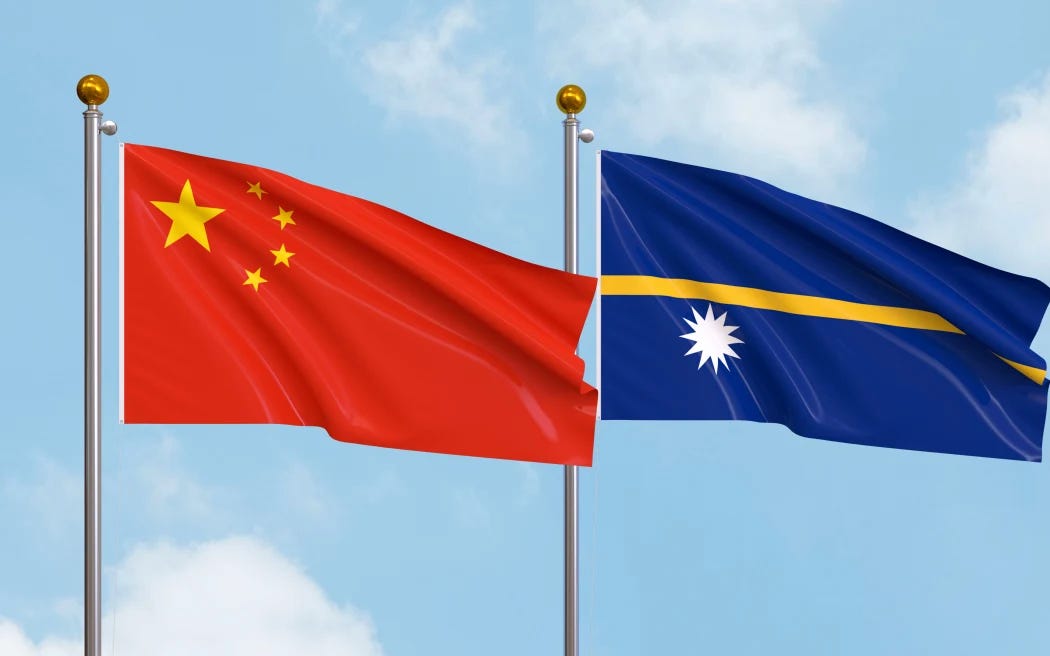Nauru Cuts Diplomatic Ties with Taiwan Authorities After Taiwan Election
Chinese Scientists Apply Quantum Encryption to E-commerce | China's A-share-listed Hepalink scammed for EUR 11.7m
Hello from Shanghai, China. Here’s our pick for today’s news:
Nauru Cuts Diplomatic Ties with Taiwan Authorities After Taiwan Election.
Chinese Scientists Apply Quantum Encryption to E-commerce.
China's A-share-listed Hepalink Scammed for EUR 11.7m.
1. Nauru Cuts Diplomatic Ties with Taiwan Authorities After Taiwan Election
On January 15, the Republic of Nauru announced that it would cut "diplomatic ties" with the Taiwan authorities and reestablish diplomatic relations with China as a recognition of the one-China principle, after ties between the two countries were severed in 2003. The move was soon appreciated and welcomed by China's Foreign Ministry. The decision "demonstrates that the one-China principle is the common aspiration," said the spokesperson of the Ministry.
The diplomatic change occurred only two days after the election results in the Taiwan region were concluded. On Saturday, the separatist Lai Ching-te won the election and became the new leader of Taiwan Island. He was the candidate from the Democratic Progressive Party, the ruling party of the region.
Nauru is an Oceanian island country with an area of only 21 square kilometers and a population of approximately 10 thousand residents, making it the third-smallest country in the world. After Nauru's reestablishment of diplomatic relations with China, Taiwan authorities now remain holding "diplomatic ties" with 12 countries.
2. Chinese Scientists Apply Quantum Encryption to E-commerce
Chinese scientists have recently proposed an e-commerce protocol that incorporates quantum technology, marking a world-first implementation with a five-user online trading scenario, as reported by China's Xinhua News Agency on January 15. The research team from Nanjing University and Renmin University of China developed a new quantum digital signature that encrypts the trading protocol, ensuring transaction integrity, authenticity, and non-repudiation. The study was published on Saturday in "Science Advances," a sub-journal of "Science."
With advancements in quantum computing, the classical encryption algorithms currently used in e-commerce are increasingly vulnerable to hacking due to exponential increases in computing power. As a result, researchers have been exploring the use of quantum entanglement, which involves distributing unhackable quantum states among multiple parties, as a means to protect against identity theft and payment fraud. The development by the Chinese research team contributes to enhancing e-commerce security in the upcoming "quantum era", said Yin Hualei, an associate professor from Renmin University of China.
3. China's A-share-listed Hepalink Scammed for EUR 11.7m
On January 14, Shenzhen Hepalink Pharmaceutical Group (Hepalink, 002399.SZ; 9989.HK) announced that its wholly-owned subsidiary, Techdow Pharma Italy S.R.L. had recently suffered from telecommunication fraud by criminal gangs, involving an amount of more than 11.7 million euros. After the occurrence of the case, the company reported the case to the local police at the first time. And they have commenced criminal investigations into the matter.
On January 15th, Hepalink fell more than 6% intraday. According to its annual report, the company had a total asset of 20.81 million yuan (HK$22.88 million) and its revenue amounted to 7.15 million yuan in 2022.
According to the official website, Hepalink was founded in Shenzhen in 1998, listed on the Shenzhen Stock Exchange in 2010, and listed on the main board of the Hong Kong Stock Exchange in 2020, with its main business covering the entire heparin industry chain, biomacromolecule CDMO and the investment, development and commercialization of innovative medicines, with more than 2,000 employees globally, business coverage in more than 40 countries and regions, and 41 subsidiaries spreading across North America, Europe and other regions. Hepalink is the leading company in the global heparin industry chain, which not only owns preparations, but also owns APIs. Especially for APIs, the August 2022 review report of Heparin's 2022 mid-year report by Soochow Securities pointed out that Hepalink is the world's largest supplier of heparin APIs (raw materials).









